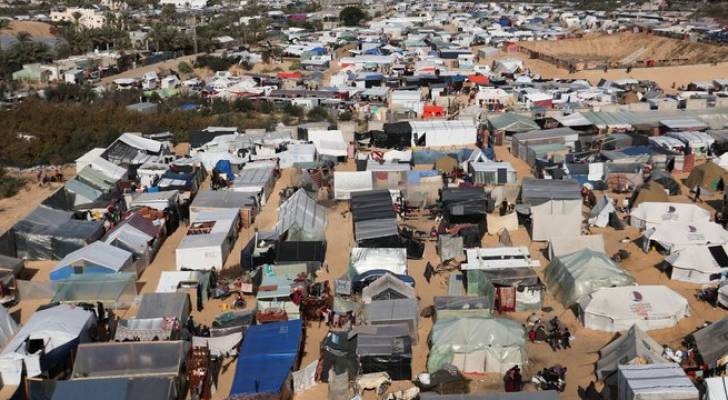Rafah’s ‘humanitarian city’: Negotiating tactic or blueprint for post-ceasefire?
A contentious 'Israeli' proposal to establish a "humanitarian city" in southern Gaza, on the ruins of Rafah, is sparking fierce debate.
Critics are questioning whether this initiative, unveiled by 'Israeli' Defense Minister Israel Katz, is a post-ceasefire plan or a strategic maneuver to tilt ongoing negotiations in their favor.
The plan has drawn widespread condemnation from international bodies, human rights organizations, and key regional players, raising serious alarms about its implications for Gaza's future and regional stability, particularly for Egypt.
Defense Minister Katz outlined the plan earlier this week, stating that the proposed "humanitarian city" would initially house around 600,000 displaced Palestinians currently in the al-Mawasi area. These individuals would undergo strict security screenings and be confined to the zone, with no permission to leave.
Ultimately, Katz suggested, all of Gaza's over two million residents would be concentrated there. He also committed to implementing a plan, first proposed by President Donald Trump, to facilitate the "voluntary migration" of Palestinians from Gaza to other countries. This concept, enthusiastically supported by 'Israeli' Prime Minister Benjamin Netanyahu, lacks any public commitment from other nations.
According to 'Israeli' media, Katz indicated that international bodies, not the 'Israeli' military, would manage the new zone, although the 'Israeli' army would secure it. This setup mirrors the controversial aid distribution model of the US- and 'Israel'-backed Gaza Humanitarian Foundation (GHF).
The feasibility of international participation remains dubious, as most organizations have shunned the GHF due to serious concerns over neutrality and the safety of Palestinian residents; hundreds have been killed attempting to access GHF aid sites.
The proposal has ignited a firestorm of criticism. UK Foreign Secretary David Lammy unequivocally rejected the plan, calling it a contradiction to ceasefire efforts and not a "serious context" for aid delivery. Hamas condemned the plan as an attempt at "ethnic cleansing," affirming the Palestinian people's steadfast refusal of forced displacement.
Human rights lawyer Michael Sfard described Katz's plan as a precursor to forcible deportation, classifying both as war crimes. He argued that any departure from Gaza under such conditions could not be considered voluntary, as "Israel imposes coercive measures on them that make their lives in Gaza impossible."
Key regional players, including the United Arab Emirates and Qatar, have also firmly rejected the forced displacement of Palestinians. UAE diplomat Lana Nusseibeh stated, "The United Arab Emirates has publicly and unequivocally rejected the forced displacement of Palestinians." Qatar's Foreign Ministry spokesperson, Majid al-Ansari, similarly affirmed, "We are against any forced displacement of Palestinians, or any deportation of Palestinians outside their lands."
This "humanitarian city" proposal follows a series of failed 'Israeli' displacement strategies since the war began in October 2023, including plans to empty northern Gaza and divide the strip into isolated "bubbles." UNRWA, the UN agency for Palestinian refugees, condemned the latest plan as "an insult to the very notion of humanity," warning it would transform Gaza into "the most overcrowded, controlled open-air prison in the world." UNRWA Commissioner-General Philippe Lazzarini stressed that a permanent ceasefire, hostage release, safe aid delivery, and a genuine commitment to a two-state solution are the only viable paths forward.
Analysts suggest these repeated displacement schemes reveal a broader 'Israeli' objective to reshape Gaza's demographic and political reality. However, years into the genocide, these efforts have largely faltered in the face of unwavering Palestinian resilience.




